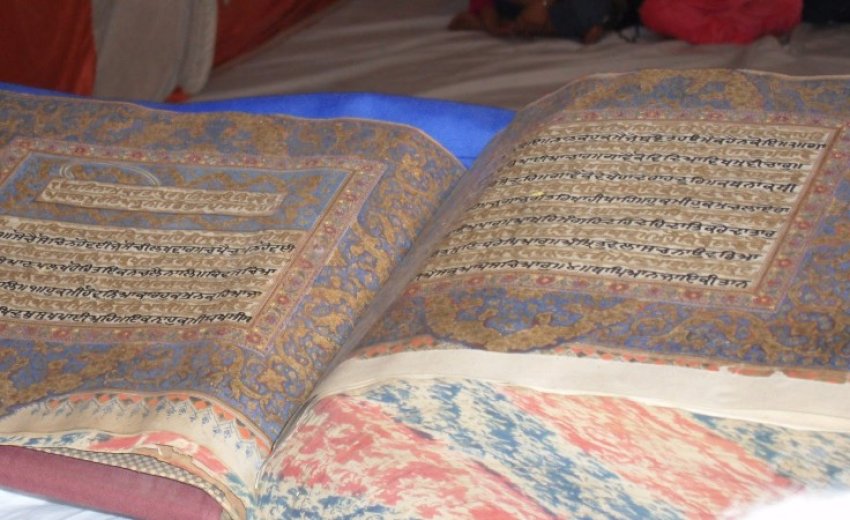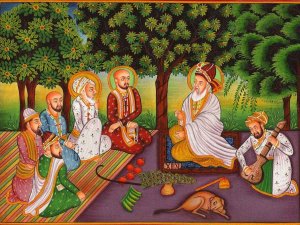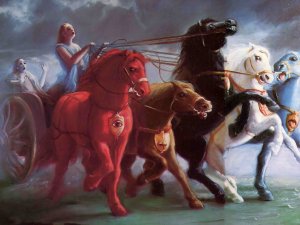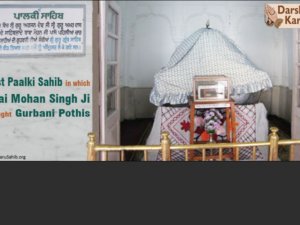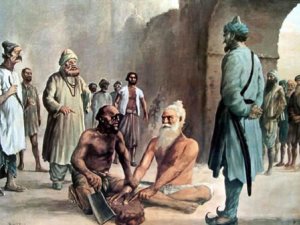Gurbani guides us not only in spiritual matters, but also in our worldly affairs. In fact, it directs us in every walk of life. It also provides us with valuable and reliable information about the political, social, economic and religious history of the fifteenth to the seventeenth century of the contemporary Punjab. This Holy Scripture also throws priceless light on the Sikh heritage and gives us significant clues about the life and times of the Sikh Gurus. Hence, it is also a genuine source of history. No doubt, it is an important landmark in the history of the Sikhs. It created consciousness among the Sikhs that they are a separate community.
Political References
The Sikh Gurus have composed many hymns which throw light on the political condition of their period. In the four hymns, collectively called Babar Vani, Guru Nanak says that the administration of Lodi Sultans was full of corruption and rotten to the core. Justice did not exist. Hindus were looked down upon. There was no security for their life, honor and property. Even their temples, gods and goddesses were taxed. Guru Nanak Dev had seen the Pathan as well as the Moghal rule and condemned the lawlessness and mismanagement of their period. The Guru has openly called their rulers blood- sucking butchers and their officials dogs who tormented people ruled by them and did not render justice. Guru Nanak has describes destruction, miserable condition of the Indian citizens and cruel behavior of the invaders at the time of Babar's invasion of Syedpur (Eminabad) in Pakistan:
kil kwqI rwjy kwsweI Drmu pMK kir aufirAw ]
kUVu Amwvs scu cMdRmw dIsY nwhI kh ciVAw ]
hau Bwil ivkuMnI hoeI ] AwDyrY rwhu n koeI ] (SGGS: 145)
'The Dark Age of Kali Yuga is a knife and the kings are the butchers.
Righteousness (Dharma) has taken wings nd flown away.
In this dark night of falsehood, the moon of Truth is not visible anywhere.
I have searched in vain, and I am so confused; in this darkness, I cannot find the path.'
Kurwswn Ksmwnw kIAw ihMdusqwnu frwieAw ] (SGGS: 360)
'After handing over the area of Khurasan to someone, Babar terrified Hindustan'.
sy isr kwqI muMnIAin@ gl ivic AwvY DUiV ]
mhlw AMdir hodIAw huix bhix n imlin@ hdUir ] (SGGS: 417)
'They, whose lustrous hair shone in plaits and were filled with vermillion in the partings, their hair were sheared with scissors and their throats choked with dust.
They who lived in palaces are not even allowed to sit even near them'.
swhW suriq gvweIAw rMig qmwsY cwie ]
bwbrvwxI iPir geI kuieru n rotI Kwie ] ](SGGS: 417)
'The rulers had lost their conscience in merry- making and revelry.
When Babar's rule was proclaimed, no (Pathan) prince ate his food'.
pwp kI jM\ lY kwblhu DwieAw jorI mMgY dwnu vy lwlo ] (SGGS: 722)
'Babar, the Moghal king, has come from Kabul with sin as his wedding party, and bids us by force to gift away (our motherland).
'rwjy sIh mukdm kuqy ]jwie jgwiein@ bYTy suqy ] (SGGS: 1288)
'The king are like tigers and their underlings like dogs; they go out and awaken the sleeping people to harass them'.
dyvl dyviqAw kru lwgw AYsI kIriq cwlI ] (SGGS:1191)
'The temples and the gods are subject to taxes; this is what it has come.'
Guru Nanak's Prophecy about Political Development: In the following reference, Guru Nanak Dev has mentioned the years of Babar's invasion, defeat of his son and taking over of Sher Shah Suri. His prophecy about Humayun and Sher Shah proved true:-
kwieAw kpVu tuku tuku hosI ihdusqwnu smwlsI bolw ]
Awvin ATqrY jwin sqwnvY horu BI auTsI mrd kw cylw ] (SGGS:723)
'Babar) coming in 1578 Vikrami (1521A.D) and his son, Humayun, will quit in 1597 Vikrami (1540 A.D) when another disciple of brave Man (Sher Shah) shall arise.'
Social Condition
The contributors of SGGS discovered so many evil practices of the time and raised their voices against them. Guru Nanak writes that Muslim civilization and custom were prevailing .The Hindus were forgetting their mother tongue, customs, and dresses and adopted the foreigner's. The Hindus were divided into four castes and those belonging to the lower castes were hated by upper castes. They were not allowed to enter the temples and kitchens of the upper caste people:
kUjw bWg invwj muslw nIl rUp bnvwrI ] (SGGS:1191)
'The Muslim ablution pot, call to prayer and prayer mat are everywhere; even the Lord appears in blue robes(as the Muslims did)'.
KqRIAw q Drmu CoifAw mlyC BwiKA ghI ] (SGGS:662)
'The Kshatriyas have abandoned their religion, and have adopted a foreign language'
dy kY caukw kFI kwr ] aupir Awie bYTy kUiVAwr ]
mqu iBtY vy mqu iBtY ] iehu AMnu Aswfw iPtY ] (SGGS:472)
'They draw lines around them, plastering the ground with cow-dung, the false come and sit within them.
They cry out, "Do not touch our food, or it will be polluted.'
Woman lost their respect & importance
During the Muslim rule women suffered the most. They were regarded as a source of sexual satisfaction. Female infanticide was common. Guru Nanak felt concerned and raised his forceful voice for their uplift. He advised people that she should not be condemned as she gives birth to great men and continues the race:
BMfhu hI BMfu aUpjY BMfY bwJu n koie ]
nwnk BMfY bwhrw eyko scw soie ] (SGGS:473)
'From woman, woman is born; without woman, there would be no one at all
O Nanak, only the True Lord is without a woman.'
Custom of Sati was prevalent and widows were burned at the pyre of their dead husbands. Guru Amar Daas vehemently condemned this cruel practice:
sqIAw eyih n AwKIAin jo miVAw lig jlµin@ ]
nwnk sqIAw jwxIAin@ ij ibrhy cot mrMin@ ] (SGGS:787)
'Do not call them 'Satee' who burn themselves along with their husbands' corpses.
O Nanak, only those who die from the shock of separation are known as 'Satee'.
Bribery was order of the day- Even kings and religious leaders were involved in it.
rwjw inAwau kry hiQ hoie ]khY Kudwie n mwnY koie ] (SGGS: 350)
'The ruler administers justice only if his palm is greased. Nobody is moved by the name of God.'
Heroes and Warriors- SGGS provides many references about the heroes and brave persons of the16th and 17th centuries. Bards sang odes in praise of popular worriers like Tunda Asraja and Sikandar Birham. Guru Arjan Dev has instructed that odes incorporated in SGGS are to be sung in the popular tune of certain vars current in those days.
Religious Condition
SGGS gives a lot of information about the prevailing religions, their sects and practices. Idolatry was common. Every city even every home had its own god or goddess. People worshipped them and looked to them for protection. In Sidh Goshat ( SGGS:938-946) Guru Nanak Dev has recorded his conversation with the Yogis who had renounced the world and were staying at mountains and in woods. SGGS tells us about various sects of Yogis and their ways of living.
vwiein cyly ncin gur ] pYr hlwiein Pyrin@ isr ] ( SGGS: 465)
'The disciples play the music, and the gurus dance. They move their feet and roll their heads.'
kbIr pwhnu prmysuru kIAw pUjY sBu sMswru ( SGGS: 1371)
'Kabeer, someone sets up a stone idol and all the world worships it as the Lord.'
Source of the Sikh History--
SGGS is an important source for writing the Sikh history. There are many historical references in the Adi Granth. Some ignorant persons calling Guru Nanak Ghost, Prithi Chand's enmity with his father, Guru Raam Daas, over his right for succession, Maata Khivi's ( Guru Angad Dev's wife) running free kitchen (Langar), Sulhi Khan's attack on Guru Arjan Dev, Hargobind's suffering from smallpox and Guru Angad's coming to Khadur and founding a village there have been mentioned:
koeI AwKY BUqnw ko khY byqwlw ] (SGGS: 991)
'He ( Guru Nanak) was sometimes termed as as ghost and sometimes as a mad person.'
kwhy pUq Jgrq hau sMig bwp ] (SGGS: 1200)
'Why, o son, do you quarrel with your father?'
blvMf KIvI nyk jn ijsu bhuqI Cwau pqRwlI ]
lµgir dauliq vMfIAY rsu AMimRqu KIir iGAwlI ] (SGGS: 967)
'Balwand says that Khivi, the Guru's wife, is a noble woman, who gives soothing, leafy shade to all.
She distributes the bounty of the Guru's Langar; the kheer - the rice pudding and ghee which is like sweet ambrosia.'
sulhI qy nwrwiex rwKu ] (SGGS:825)
'God saved us from Sulhi Khan.'
sIqlw qy riKAw ibhwrI ] pwrbRh m pRB ikrpw DwrI ] (SGGS:200)
'The Joy-giver has saved (Hargobind) from smallpox. The Lofty Lord has shown His mercy.'
Pyir vswieAw Awix siqgur KfUr ] (SGGS: 967)
'Guru Angad came and founded Khadur.'
Account of travels of Guru Amar Daas has also been given in a hymn composed by Guru Ram Daas (SGGS:1116).
Conclusion
SGGS is not only our spiritual and worldly guide, but also a significant source of information about the political, social, religious and economic life of those days. It is also an important and reliable source of the Sikh History. Only a few references are quoted to keep the article brief.

